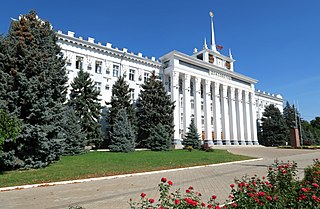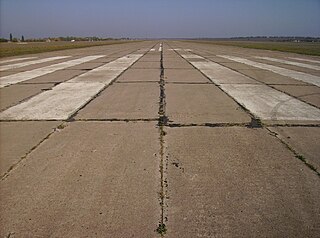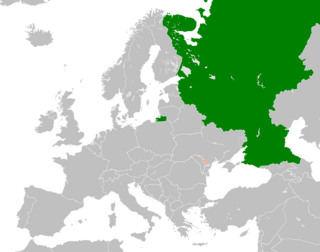| |||||
| Decades: | |||||
|---|---|---|---|---|---|
| See also: | |||||
Events in the year 2024 in Transnistria .
| |||||
| Decades: | |||||
|---|---|---|---|---|---|
| See also: | |||||
Events in the year 2024 in Transnistria .
The history of Moldova spans prehistoric cultures, ancient and medieval empires, and periods of foreign rule and modern independence.

The politics of Moldova take place in a framework of a parliamentary representative democratic republic, wherein the prime minister is the head of the Government of Moldova, and a multi-party system. The President of Moldova has no important powers. The government exercises executive power while the legislative power is vested in the Parliament. The judiciary is independent of the executive and the legislature. The position of the breakaway region of Transnistria, relations with Romania and with Russia, and integration into the EU dominate political discussions.

The Armed Forces of the Republic of Moldova consist of the National Army and the Trupele de Carabinieri under the Ministry of Internal Affairs. Until 2012, the Moldovan Border Police belonged to the armed forces.

Tiraspol is the capital and largest city of Transnistria, a breakaway state of Moldova, where it is the third-largest city. The city is located on the eastern bank of the Dniester River. Tiraspol is a regional hub of culture, economy, tourism, and light industry, such as furniture and electrical goods production.

Transnistria, officially known as the Pridnestrovian Moldavian Republic and locally as Pridnestrovie, is a landlocked breakaway state internationally recognized as part of Moldova. It controls most of the narrow strip of land between the Dniester river and the Moldova–Ukraine border, as well as some land on the other side of the river's bank. Its capital and largest city is Tiraspol. Transnistria is officially designated by the Republic of Moldova as the Administrative-Territorial Units of the Left Bank of the Dniester or as Stînga Nistrului.

The Transnistria conflict is an ongoing frozen conflict between Moldova and the unrecognized state of Transnistria. Its most active phase was the Transnistria War. There have been several unsuccessful attempts to resolve the conflict. The conflict may be considered to have started on 2 September 1990, when Transnistria made a formal sovereignty declaration from Moldova.

The state of affairs with human rights in Transnistria has been criticized by several governments and international organizations. The Republic of Moldova, and other states and non-governmental organizations (NGOs) claim that the government of Transnistria is authoritarian and has a record of arbitrary arrest and torture.
Cobasna is a commune in northern Transnistria, Moldova that is composed of three villages: Cobasna, Cobasna station, and Suhaia Rîbnița. It is controlled by the self-proclaimed authorities of Transnistria. It is located 2 km from the border with Ukraine, in Rîbnița District.
Vărăncău is a commune in the Rîbnița District of Transnistria, Moldova, composed of three villages: Buschi (Буськи), Gherșunovca (Гершунівка) and Vărăncău. It is located 15 kilometres southeast of Rîbnița.

The Transnistrian republic is recognized by two states with limited recognition, and is a member of one international organization, the Community for Democracy and Human Rights.

Moldova–Russia relations are the bilateral relations between the Republic of Moldova and the Russian Federation, two Eastern European, post-Soviet, ex-communist countries. Russian support for the self-proclaimed Pridnestrovian Moldavian Republic (Transnistria) and a substantial Russian military presence therein strained Moldovan relations with Russia.

The Armed Forces of the Pridnestrovian Moldavian Republic are the military forces of the unrecognized state of Transnistria. The Armed Forces fall under the leadership of the Ministry of Defence. The Armed Forces were created on 6 September 1991 to maintain the sovereignty and independence of the Pridnestrovian Moldavian Republic, in accordance with Article 11 of the Republic's Constitution.

Tiraspol Airport is an airport located in Tiraspol. It previously served as a military air base.

Russia–Transnistria relations are the bilateral relations between the Pridnestrovian Moldavian Republic (Transnistria), an unrecognised breakaway state that is internationally recognised as part of Moldova, and the Russian Federation. Russia does not officially recognise the independence of Transnistria; nevertheless, Russia maintains special relations with Transnistria in the political, military, cultural, and economic spheres.
The Cobasna ammunition depot, formally the 1411th Artillery Ammunition Depot, is a large ammunition depot located in the village of Cobasna. Legally and internationally recognized as part of Moldova as a whole, the unrecognized breakaway state of Transnistria controls the village and the ammunition depot and has denied access to international observers, an exception being the Russian military forces located in the region ever since the end of the Transnistria War in 1992. Outside access to the ammunition depot is effectively prohibited. Only the Russian and Transnistrian authorities have detailed information regarding the amount and situation of the stored weapons.

There have been attacks in mainland Russia as a result of the Russian invasion of Ukraine, which began on 24 February 2022. The main targets have been the military, the arms industry and the oil industry. Many of the attacks have been drone strikes, firebombing, and rail sabotage. The Ukrainian intelligence services have acknowledged carrying out some of these attacks. Others have been carried out by anti-war activists in Russia. There have also been cross-border shelling, missile strikes, and covert raids from Ukraine, mainly in Belgorod, Kursk, and Bryansk oblasts. Several times, Ukrainian-based paramilitaries launched incursions into Russia, captured border villages and battled the Russian military. These were carried out by units made up mainly of Russian emigrants. While Ukraine supported these ground incursions, it denied direct involvement.

The 2022 Transnistria attacks were a series of five incidents reported in the Eastern European breakaway state of Transnistria, internationally recognized as part of Moldova, that occurred in 2022 between 25 and 27 April, on 6 May and on 5 June. No casualties were reported, but material damage did occur.
Events in the year 2022 in Transnistria.
Following the Russian invasion of Ukraine, Moldova accepted Ukrainian refugees, opened a bank account for donations, and unofficially imposed sanctions on Russia.
Events from the year 2024 in Moldova.